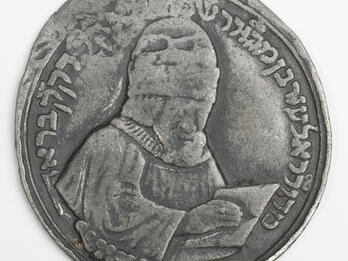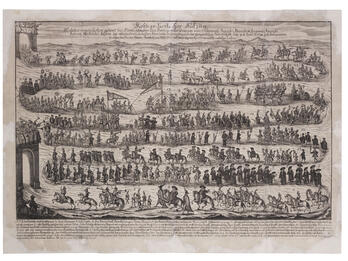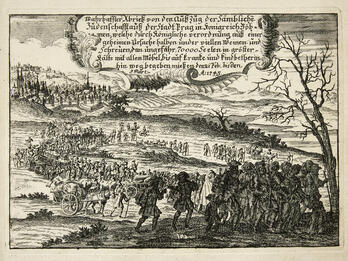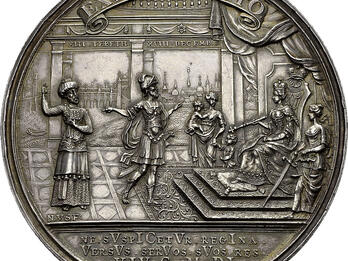Ayn naye kornayk (A New Chronicle)
The Guilds and the Jews
Ch. 16. Trouble between Gentile Fish-wives and Jewish Fishmongers
[1742] In the week when we read the portion Toledoth of the Pentateuch a proclamation was issued by the burgomasters and aldermen of Amsterdam, together with the governors of the Jewish community, prohibiting Jews from selling fish, whether in the streets or indoors. Anyone taken in the act would have to bear the consequences. This was proclaimed in all the synagogues. The governors then sent out their inspectors to warn people against selling fish. Offenders were to be punished by the Jewish community according to their deserts. The authorities were keeping a sharp lookout. Thereupon the fishmongers went before the governors of the Jewish community. They complained and declared they could not and would not tolerate [the prohibition], even if they were all to be hanged.
They would acquiesce only if the authorities also prohibited Gentile fishwives in the streets. For [as they said] this was a free country, where trade was also free. Otherwise it would be up to the lords governors to provide them with food.
Now the governors intervened [with the authorities] and brought forward the objections of the fishmongers. As a result a placard was immediately proclaimed, prohibiting Gentiles, too, from selling fish in the streets. And directly afterwards another placard appeared forbidding all vending of fish, whether by Jews or Gentiles. This was so strict a prohibition it could hardly be believed. Any offender was to be flogged, branded and banished without pardon, and without right of appeal.
Upon which there assembled a throng of Gentile fishwives from French Path and Devil’s Corner, an indescribably large number.
Ch. 17. How the Gentile Fishwives Gathered in Warmoes Street and Held up the Burgomaster’s Coach and Horses
At 8 in the morning on the Tuesday a multitude of fishwives, holding their children by the hand, flocked together in Warmoes Street, and tidings of this gathering reached the Jordaan, where the riff-raff live, so that even more women came to join them.
After a while one of the burgomasters drove up. Thereupon the women attacked the coach, held up the horses, and shouted, “We will not let go of the horses before the lord burgomaster gives food to us and to our children. Or else we shall all come to the Town Hall and then such things will happen that the whole world will know what the women of Amsterdam have done.” Their menfolk, too, were congregating in broad daylight, so that many people saw them, as you can well imagine. They would barely let go of the horses, and then only after many soothing words from the burgomaster. He requested them to come to the Town Hall when the magistrates were meeting, and he would do his best to have the placards regarding the fish-vending revoked. But they would have to show a little patience. This he promised them faithfully, and so it was done. The women held a meeting and from their midst they chose four honest women who were more or less presentable, to speak for them before the burgomasters. And so it was done.
Ch. 18. How the Women then Immediately Called on the Burgomaster
The women did not stay long at the Town Hall. From there they went in groups to the sheriff, where they repeated their complaint. The sheriff told them to go back to the Town Hall and everything would be revoked within one or two hours. In the meantime the four women appeared before the burgomasters and on the spot obtained the decree cancelling the placards. Full of rejoicing they then returned, singing and dancing, to their homes. The Jewish fishmongers had also been waiting in front of the Town Hall to see how the affair would turn out for the women. And as soon as they saw that the prohibition had been lifted for the women they, too, started selling fish again and returned to their former pitches, and everything remained as it was before. Nevertheless even after that day constables might come and take fish away from the Jews. This happened many times.
Ch. 42. Now I Shall Describe Further Hardships in Amsterdam, How Jews Had Their Merchandise Taken Away
[1745] This time the Gentile cotton merchants lodged a complaint with the burgomasters of Amsterdam against those cotton dealers who carted their wares about in wheelbarrows crying out the prices. Thereupon the sheriff ordained that whosoever did so, his wares would be confiscated. And it happened that the first one to suffer was the son of Mr. Itziq Shveriner. He was taken by the constables at the Narrow Bridge near Church Street where he was crying his wares as usual. The constables came out of the wine house and took away all his wares. He never got them back, however much trouble he took.
Ch. 177. How Other Guilds Also Approached the Burgomasters in Order to Add Force to the Above
When the other craftsmen heard that the diamond-cutters were taking steps, in order to strengthen their position, to form a guild, which they had not previously had in Amsterdam, they too approached the burgomasters on the same day in order to reinforce their own guilds by adding certain regulations to their own statutes, or cancelling certain others. All by order of the burgomasters. These authorities listened to them courteously and asked them to return the following week.
In the meantime, the burgomasters reflected that, if this were to be allowed to go on, they would never have a day’s rest, as had lately been the case. So, they acted very carefully and very wisely in this matter, and decided, whatever happened, and whichever guild made its representations, they would all be refused. And so it was done. Whereupon the burgomasters caused a placard to be proclaimed from the Town Hall steps to the effect that no master or other official of any guild was to attempt to put forward any new proposals relating to the affairs of the guilds. Else their guild would be abolished altogether, and henceforth there would no longer be a guild for that trade. This benefited the Jews. The Lord—let Him be praised—will continue to protect us and grant us favor in the eyes of the authorities. Amen.
Notes
Words in brackets appear in the original translation.
Credits
Abraham Ḥayim Braatbard, “The Yiddish Chronicle of Abraham Ḥayim Braatbard,” trans. Leo Fuks, from Aspects of Jewish Life in the Netherlands: A Selection from the Writings of Leo Fuks, ed. Renate G. Fuks-Mansfeld (Assen, The Netherlands: Van Gorcum, 1995), pp. 164–66. Used with permission of the publisher.
Published in: The Posen Library of Jewish Culture and Civilization, vol. 5.






